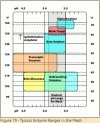- Joined
- Oct 28, 2023
- Messages
- 48
- Reaction score
- 46
- Points
- 18
So I've been trying to mash in my boil kettle (I made a little jacket for it out of foil lined bubble wrap) and a couple of things happened on the trial run. First, the temperature fell more over an hour (off the flame) that I would have liked. But I think I can control for that okay.
More importantly, the following accident happened. After dropping down in temperature to an unideal range (148 degrees F), my kettle thermometer then got stuck there. I put the pot on to warm it up a little. But, not noticing the thermometer had gotten stuck, I then didn't realize how hot it was then getting. It was only after it had been on the flame for a while that I finally got suspicious. (Yes, I was multitasking).
Anyways, i now think that my mash likely had the following form:
Started at 164 degrees when I added malt;
Dropped over about 35 minutes to 148 while I wasn't watching;
Then (likely) sprang up to like 190 (it was close to a boil, I think) while the thermometer got stuck.
I'm wondering what the consequences might be. Any guesses? I'm guessing there could be some unwanted astrigency, etc. Should I dump it out?
Right now, it seems to be fermenting happily enough (day two) but i don' t know about off flavors.
Thanks!
John
(I'm also in the market for a new kettle thermometer. The one I have did get unstuck, but the needle moves in skips rather than smoothly and I think is just not a great thermometer).
More importantly, the following accident happened. After dropping down in temperature to an unideal range (148 degrees F), my kettle thermometer then got stuck there. I put the pot on to warm it up a little. But, not noticing the thermometer had gotten stuck, I then didn't realize how hot it was then getting. It was only after it had been on the flame for a while that I finally got suspicious. (Yes, I was multitasking).
Anyways, i now think that my mash likely had the following form:
Started at 164 degrees when I added malt;
Dropped over about 35 minutes to 148 while I wasn't watching;
Then (likely) sprang up to like 190 (it was close to a boil, I think) while the thermometer got stuck.
I'm wondering what the consequences might be. Any guesses? I'm guessing there could be some unwanted astrigency, etc. Should I dump it out?
Right now, it seems to be fermenting happily enough (day two) but i don' t know about off flavors.
Thanks!
John
(I'm also in the market for a new kettle thermometer. The one I have did get unstuck, but the needle moves in skips rather than smoothly and I think is just not a great thermometer).










